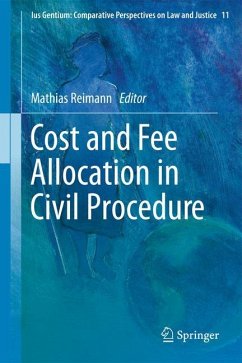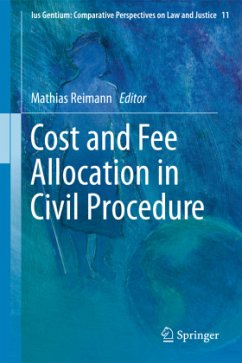
Class Actions in Europe
Holy Grail or a Wrong Trail?
Herausgegeben: Uzelac, Alan; Voet, Stefaan

PAYBACK Punkte
61 °P sammeln!
Not so long ago, class actions were considered to be a textbook example of American exceptionalism; many of their main features were assumed to be incompatible with the culture of the civil law world. However, the tide is changing; while there are now trends in the USA toward limiting or excluding class actions, notorious cases like Dieselgate are moving more and more European jurisdictions to extend the reach of their judicial collective redress mechanisms. For many new fans of class actions, collective redress has become a Holy Grail of sorts, a miraculous tool that will rejuvenate national ...
Not so long ago, class actions were considered to be a textbook example of American exceptionalism; many of their main features were assumed to be incompatible with the culture of the civil law world. However, the tide is changing; while there are now trends in the USA toward limiting or excluding class actions, notorious cases like Dieselgate are moving more and more European jurisdictions to extend the reach of their judicial collective redress mechanisms. For many new fans of class actions, collective redress has become a Holy Grail of sorts, a miraculous tool that will rejuvenate national systems of civil justice and grant them unprecedented power.
Still, while the introduction of various forms of representative action has virtually become a fashion, it is anything but certain that attempting to transplant American-style class action will be successful. European judicial structures and legal culture(s) are fundamentally different, which poses a considerable challenge.
This book investigates whether class actions in Europe are indeed a Holy Grail or just another wrong turn in the continuing pursuit of just and effective means of protecting the rights of citizens and businesses. It presents both positive and critical perspectives, supplemented by case studies on the latest collectivization trends in Europe's national civil justice systems. The book also shares the experiences of some non-European jurisdictions that have developed promising hybrid forms of collective redress, such as Canada, Brazil, China, and South Africa. In closing, a selection of topical international cases that raise interesting issues regarding the effectiveness of class actions in an international context are studied and discussed.
Still, while the introduction of various forms of representative action has virtually become a fashion, it is anything but certain that attempting to transplant American-style class action will be successful. European judicial structures and legal culture(s) are fundamentally different, which poses a considerable challenge.
This book investigates whether class actions in Europe are indeed a Holy Grail or just another wrong turn in the continuing pursuit of just and effective means of protecting the rights of citizens and businesses. It presents both positive and critical perspectives, supplemented by case studies on the latest collectivization trends in Europe's national civil justice systems. The book also shares the experiences of some non-European jurisdictions that have developed promising hybrid forms of collective redress, such as Canada, Brazil, China, and South Africa. In closing, a selection of topical international cases that raise interesting issues regarding the effectiveness of class actions in an international context are studied and discussed.












